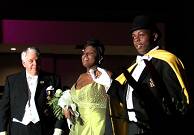|
|
||||
|
|
by Donald Levit  Director, co-producer and –editor Margaret Brown’s The Order of Myths takes its title from her Mobile, Alabama, hometown’s oldest mystic society, of which fraternal group her interviewed courtly Southern grandfather Dwain Luce has been a Knight since 1971 and of which city her mother had been white Mardi Gras Queen five years before that. With the broadening perspective of having lived away, Brown started her documentary from an ambivalence that she noticed and attempts to record -- “the narrative could wait” -- of not only a concrete cultural phenomenon but an attitude about race and, behind, or twined about, that tradition. The focal site/event is Aside from a humorous hanging one-word ending, “okay,” in reply to Grandpa Dwain’s tantalizing promise to reveal something absolutely off the record, the filmmaker keeps herself absent. Yet the sense is that the Northeast-educated returnee now sees, and presents, a monumental cavalier silliness tied to harmful tradition and white men’s self-serving deception that African-Americans prefer their own ceremony and separateness. Not for nothing does she include, mixed with the sugary platitudes and adolescent liberalism, death photos of resident Michael A. Donald, in 1981 one of the country’s last lynch victims. Nor are the port’s paper mills mentioned, source of much local wealth and of an unpleasant reek for miles around. But play is given to that wealth, to “pedigree,” to the idealization of aristocracy and the secret-membership societies that derive from it and are a base of the Mardi Gras and pageantry. Foolishness, fun, or fascism, they exist in the Northeast’s Ivy League, too -- director and central debs are Brown women -- and Old Dominion Virginia (whose collegiate teams are Cavaliers) and were lamented by Southerners Twain (who blamed Sir Walter Scott) and Faulkner as the root of Gone-with-the Wind-ism. Cowboy duds mixing with fancied seventeenth-century outfits that in one case call up Klan Knights, Wizards and Dragons, they are the Order of Myths, the Strikers, the Mobile Mystics and, on the black side, Conde Explorers with its single white member. Doing public-spirited deeds like a hospital Goodwill Tour or financing and parading floats that run $60-75,000 and up, at heart they echo citizens’ mantra that a man invites into his home-castle, or excludes from it, whomever he chooses. Although equal time is devoted to queen’s court lady Brittain Youngblood, center screen are 2007’s two sets of carnival royalty. To be crowned at the deliciously named “We have no troubles with the blacks, no conflict, get along fine.” With those blacks as musicians and dancers only, the MCA parade starts at one in the afternoon, the MAMGA affair at two “on the same day,” reads a subtitle which hesitates a moment before adding, “at different places.” Under the preparation and partying, indicated here and there but brought together by African-American activist and local historian Dora Finley, is an instance of The Order of Myths is not lessened by the easiness of some targets, whose getups and words just cry out for sniggers. Time is lost in several cute but unnecessary schoolchildren reading about moon pies, but the camera effectively pictures the two separate but equal Mardi Gras and contrasts the faux-baroque finery with some urban scruffiness. Had the bite been deeper, this would have been memorable. (Released by The Cinema Guild; not rated by MPAA.) |
||
|
© 2024 - ReelTalk Movie Reviews Website designed by Dot Pitch Studios, LLC |



